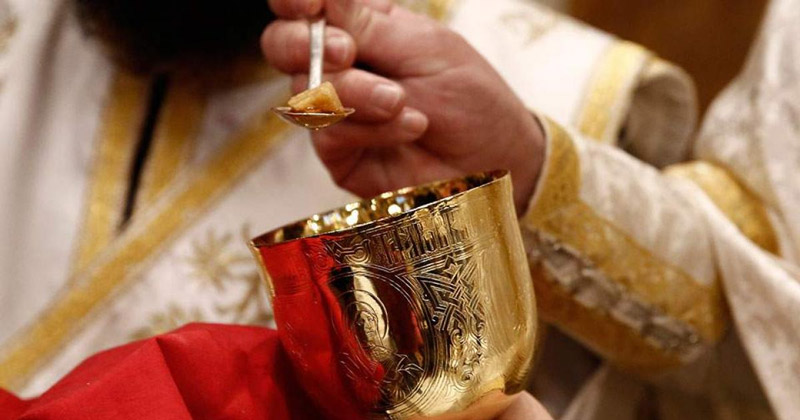
After the reading of the last prayers of the the Service before the divine Communion, the Celebrants come to commune in the prescribed hierarchical order. Each one bows first to his co-Celebrants and then to the people, asking and giving forgiveness. If there is a Bishop, he communes first and then he communes his fellow priests and deacons. First they partake of the Holy Body. The way in which the Priest communes even when he is serving alone has deep symbolism. After venerating the Holy Table, he extends his right palm over the holy Disc, and he takes a small piece of the Holy Body and places it in his open left palm saying: "Unto me, (Name), the unworthy presbyter, is imparted the precious and all-holy Body of our Lord… for the remission of my sins and life eternal." He addresses the given of the Gifts to a third person, from whom it is transmitted to him; and this person is Christ. Christ Himself receives the Priest, as well as then Christ communicates the faithful with the hand of the priest. That is why the priest, when he communicates with every believer, says: "The servant of God receives (name) ...". We also see from these expressions that our Lord Jesus Christ is, as a prayer says, "the Offered and the one who Offers"; that is, He does all things, using us to honor us.
At this point it is worth remembering the patristic saying: "The priest transmits to all who come the holy Body and Blood of the Lord. But Christ unites and provides His holy grace only to the worthy." Which means that the Lord is in charge of everything. Therefore, the moment we commune we should have in mind that the Lord knows our whole inner world and we should have a clear conscience. Thus Christ will commune with us through the hand of the priest and will unite us with Him.
At the invitation of the Deacon: "With the fear of God, faith, and love, draw near", the prepared believers come to commune. The fear of God, faith and love is the attitude with which we come to commune. Faith is the beginning of the path that leads to Holy Communion. Love is the end. The moment when man accepts Christ in himself is the moment of the highest love. It is the moment of divine love that is offered and of human love that comes and accepts that gift.
The Celebrant, transmitting the holy Body and Blood of the Lord to every believer, names each by name. By the name given to him when he became the Son of God, when he was baptized in the name of the Father and of the Son and of the Holy Spirit. The Celebrant calls him by thay name and thus reveals his spiritual origin.
The event of Holy Communion is the personal encounter of man with God. With Holy Communion we become united with the holy Blood of Christ, we become a parts of His holy Body. The Holy Blood of the Master is mixed with us and transforms our life. It makes it robust and pure and leads it flawlessly to its final destination, to the kingdom of God.
After the Divine Communion of the faithful, the Celebrant, blessing the people with the Holy Chalice, exclaims: "Save, O God, Your people, and bless Your inheritance". The people, receiving the blessing, sing triumphantly: "We have seen the true light; we have received the heavenly Spirit…". With the divine Communion the believer received within himself the true Light. His soul has been united with Christ, the sun of righteousness. His mind is inspired by God and encompassed by divine light.
We received in our souls not just a ray of light, but the whole disk of the Sun of rightiousness. And by grace, we became suns that satellite the only Sun. Because Christ, after surrounding everything with His enlightening power, puts into the worthy a continuous and uninterrupted light, and makes into suns those who participate in that light. These descriptions of spiritual experiences have been delivered to us by the Fathers of the Church, from their own participation in the divine Communion.
After the communion of the faithful, the Celebrant returns to the Holy Altar and transfers into the Holy Chalice the portions of the Virgin Mary and the Saints from the Discos while reciting the Prayer of ressurrection: "Having beheld the Resurrection of Christ...".
Indeed, in the Divine Liturgy we witnessed the Resurrection of Christ. We saw the eucharistic celebration being officiated. We experience now - with divine Communion – how the Master Christ is resurrected within us, shining and blazing with the light of incorruption and divinity.
Because with the Divine Liturgy we can continually proclaim the death of the Lord (1 Cor. 11:26) and confess His Resurrection, we can always celebrate the Passover of Christ in every Eucharistic gathering.
Every divine Liturgy is the Resurrection of Christ, and every divine Communion is the resurrection of the man who participates in it. For, as the corpse that has been deprived of the living soul can not live alone, so the soul, if deprived of the Christ who animates it, cannot live alone. The Lord said, "Verily, verily, I say unto you, Except ye eat the flesh of the Son of man, and drink his blood, ye have no life in you. Whoso eateth my flesh, and drinketh my blood, hath eternal life" (John 6:53).
With the Divine Liturgy we participate in the true Pascha/Easter. And we ask the Lord to require us to have us near Him on the day of His Kingdom. Amen.





